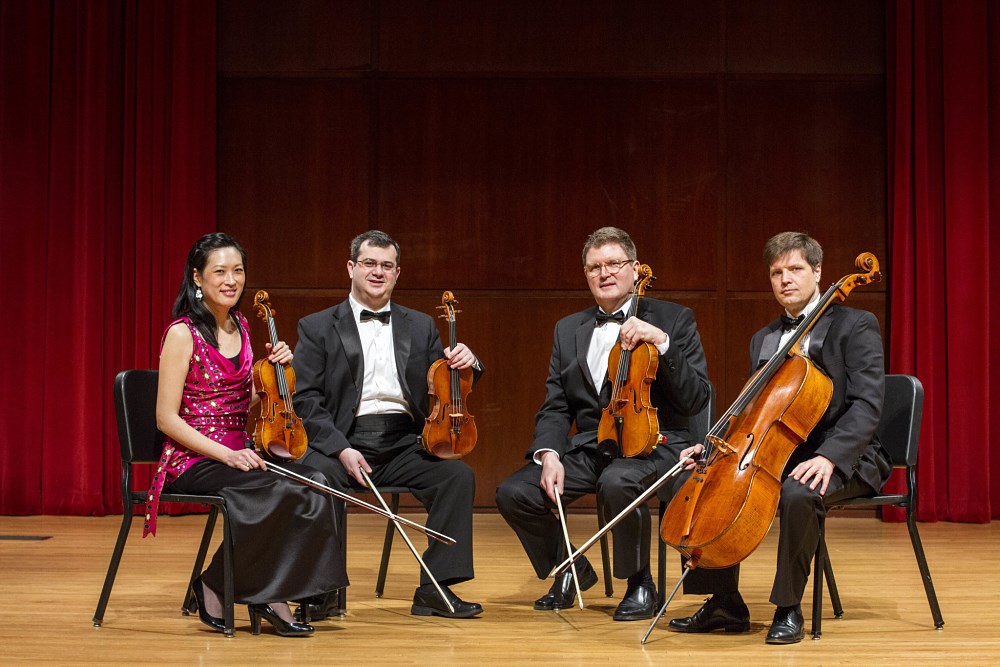We’re Playing Three Great Composers
Philomusica Quartet does Mendelssohn, Tchaikovsky, Shostakovich.
The Philomusica Quartet (violinists Jeanyi Kim and Alexander Mandl, violist Nathan Hackett and cellist Adrien Zitoun) opens an ambitious season on Monday evening, September 17 at Wisconsin Lutheran College.
One of Felix Mendelssohn‘s best quartets, the String Quartet No. 3 in D major, Op. 44, No. 1, offers a bright, optimistic tone to open the concert. Critic Misha Armory describes the sophisticated character of the work’s first movement:
Although it is technically composed in a sonata-allegro form, the experience of hearing it evokes not so much a strict form as an odyssey, a journey to many different lands. There are two reasons for this. First, there are many different thematic ideas that turn up one after the other, like so many islands in an archipelago: the exuberant opening melody, with a rocketing figure in the first violin; a sweet chromatic figure in a softer dynamic; a momentary tender aside in the viola; a hushed, choral utterance in a minor key; and a merry caper to the end of the exposition. Second, there is a musical “ship”: an omnipresent rolling 8th-note texture that creates an inexorable motion, bearing us from one island to the next.
Driving rhythms maintain a momentum throughout. Even the slow movement, a sad beautiful aria featuring the first violin, rests upon a steady accompaniment from the other players.
The Philomusica complete a short cycle of Pyotr Tchaikovsky string quartets with his String Quartet No. 1 in D major, Op. 11. The quartet has been given the nickname “Accordion” because of an opening chorale where the harmonies of the quartet blend to create overtones that sound very much like an accordion. This brief effect does not represent the rest of the piece.
Tchaikovsky wrote few chamber works, but this has been recognized as his best. An andante cantabile movement adapts a popular Russian folk melody in a simple, beautiful aria. That movement was reworked several times as a stand-alone work perhaps best known as the Andante Cantabile for cello and orchestra.
The work stand outs out most of all for well-structured counterpoint. Critic Kai Christansen describes the final movement:
The finale is a combination of sonata and rondo form full of bristling vigor, wonderful quartet textures, unmistakable touches of Tchaikovsky’s lyrical drama and tinged, in parts, with a distinctly Russian cast. With its poise, balance and concision, it is utterly classical in the true sense of the word. In fact, it is oddly reminiscent. Despite the definite mark of Tchaikovsky’s personality, it bears a striking and detailed resemblance to the string quartet music of Tchaikovsky’s greatest musical idol: Mozart.
A break between the larger works features an early string quartet work by Dmitry Shostakovich, Two Pieces for String Quartet. Shostakovich transcribed material from two operas, but was able to create rich harmonies for string quartet. The first section of the work draws from a popular Shostakovich opera: Lady MacBeth of Mtsensk. The central character, suppressed by husband and father-in-law, expresses her search for happiness in an aria with a distinctly Russian elegiac flavor. In contrast, the second section, a transcription from his opera Age of Gold, offers a pizzicato polka meant as a satirical comment on Johann Strauss‘s work and Western sensibilities. The polka theme has recurred in many Shostakovich works.
The concert’s title – “Delight and Melancholy” – applies to all three works. Each has bright, optimistic elements. Each includes an aria with touches of sadness – solo voices “sing” lovely but melancholic songs. The arias are memorable – perhaps already familiar to many. And more structured movements feature virtuoso playing and well-structured chamber conversations with a debt to Mozart and Bach.
Philomusica will hold their concert Monday, September 17th at 7:30 p.m. at Wisconsin Lutheran College, Center for Arts and Performance, Schwan Concert Hall located at 8815 W. Wisconsin Ave., Milwaukee, WI 53226. Free parking is available in a parking garage to the East of the hall. Tickets can be purchased for $25 online at or by calling the box office at 414-443-8802.
The Philomusica Quartet enters their 11th season and their third in-residence at Wisconsin Lutheran College. They will play three concerts at Wisconsin Lutheran – September 17, February 18 and April 8. This year, the Quartet will also return to their previous home, the Wisconsin Conservatory of Music for two additional concerts – on November 19 and May 20. Details for all concerts may be found at the Philomusica Quartet site.
Preview
-
A Sacred Choir, 70 Voices Strong
 Dec 14th, 2025 by Martha Brown
Dec 14th, 2025 by Martha Brown
-
Prometheus Trio Goes Bohemian
 Dec 3rd, 2025 by Martha Brown
Dec 3rd, 2025 by Martha Brown
-
Present Music Offers New Choral Works
 Nov 20th, 2025 by Michael Barndt
Nov 20th, 2025 by Michael Barndt





















